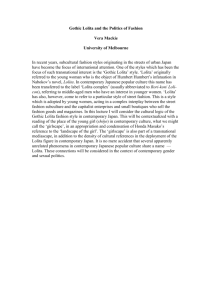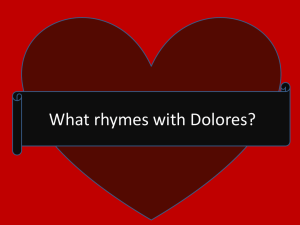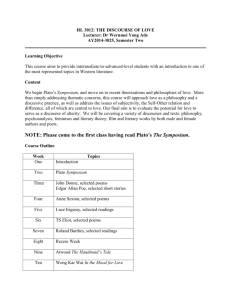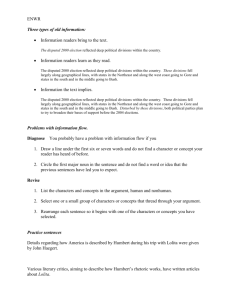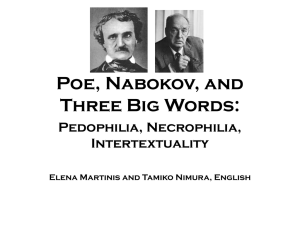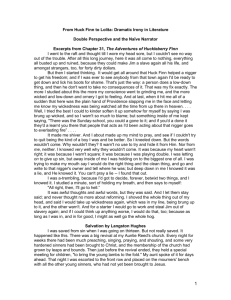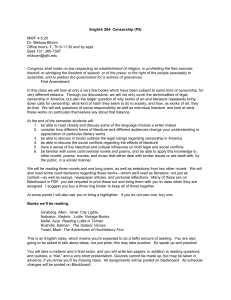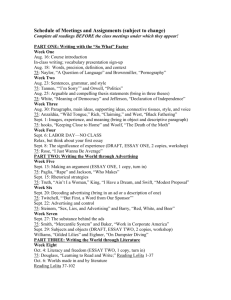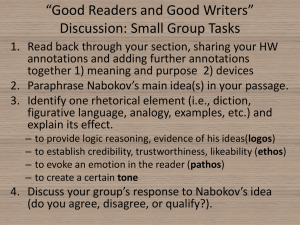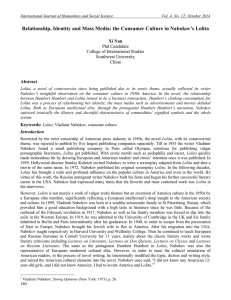Week 8: Lolita - University of Warwick
advertisement
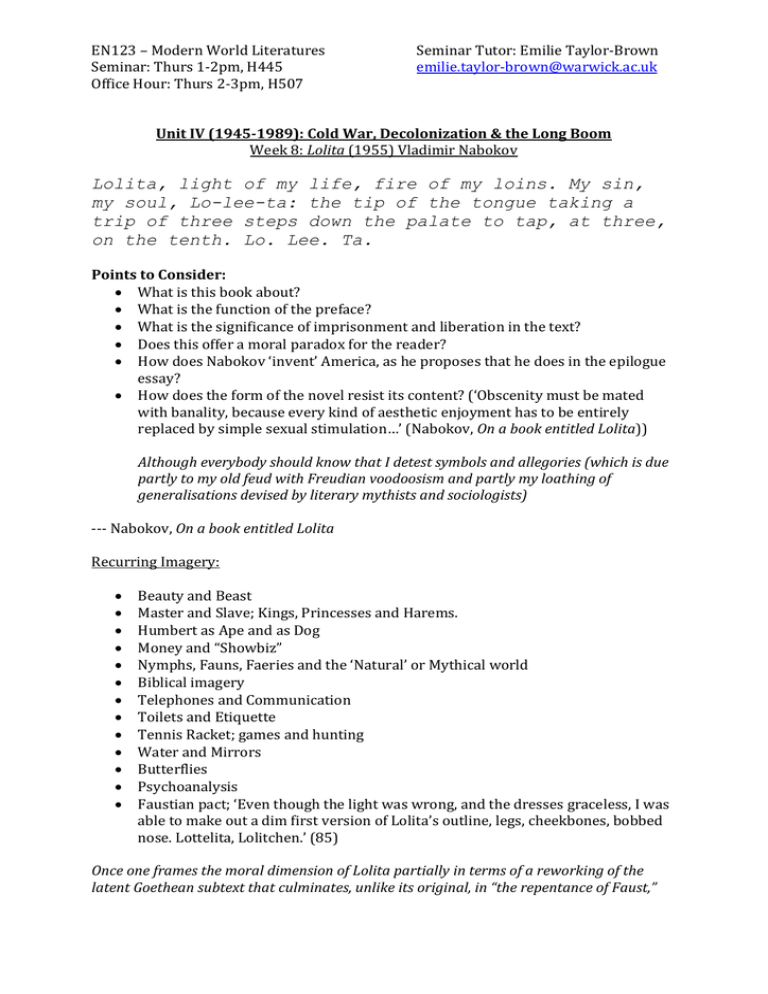
EN123 – Modern World Literatures Seminar: Thurs 1-2pm, H445 Office Hour: Thurs 2-3pm, H507 Seminar Tutor: Emilie Taylor-Brown emilie.taylor-brown@warwick.ac.uk Unit IV (1945-1989): Cold War, Decolonization & the Long Boom Week 8: Lolita (1955) Vladimir Nabokov Lolita, light of my life, fire of my loins. My sin, my soul, Lo-lee-ta: the tip of the tongue taking a trip of three steps down the palate to tap, at three, on the tenth. Lo. Lee. Ta. Points to Consider: What is this book about? What is the function of the preface? What is the significance of imprisonment and liberation in the text? Does this offer a moral paradox for the reader? How does Nabokov ‘invent’ America, as he proposes that he does in the epilogue essay? How does the form of the novel resist its content? (‘Obscenity must be mated with banality, because every kind of aesthetic enjoyment has to be entirely replaced by simple sexual stimulation…’ (Nabokov, On a book entitled Lolita)) Although everybody should know that I detest symbols and allegories (which is due partly to my old feud with Freudian voodoosism and partly my loathing of generalisations devised by literary mythists and sociologists) --- Nabokov, On a book entitled Lolita Recurring Imagery: Beauty and Beast Master and Slave; Kings, Princesses and Harems. Humbert as Ape and as Dog Money and “Showbiz” Nymphs, Fauns, Faeries and the ‘Natural’ or Mythical world Biblical imagery Telephones and Communication Toilets and Etiquette Tennis Racket; games and hunting Water and Mirrors Butterflies Psychoanalysis Faustian pact; ‘Even though the light was wrong, and the dresses graceless, I was able to make out a dim first version of Lolita’s outline, legs, cheekbones, bobbed nose. Lottelita, Lolitchen.’ (85) Once one frames the moral dimension of Lolita partially in terms of a reworking of the latent Goethean subtext that culminates, unlike its original, in “the repentance of Faust,” EN123 – Modern World Literatures Seminar: Thurs 1-2pm, H445 Office Hour: Thurs 2-3pm, H507 Seminar Tutor: Emilie Taylor-Brown emilie.taylor-brown@warwick.ac.uk then Humbert’s confession would appear not only sincere, but tragically sincere, since his tears of repentance will not bring Lolita back to him, nor will they restore to Lolita her lost childhood. [The text is suffused with] the theme of brutal victimization in general, as illustrated in the novel not only by Humbert’s sequestration and sexual abuse of Lolita but also by his cruelly manipulative relationship with her mother Charlotte and by his coldblooded murder of Clare Quilty, three acts corresponding roughly to Faust’s seduction of Gretchen and his subsequent failure to protect her as an orphan, to the accidental fatal poisoning of her mother, and to the murder of her brother in a duel. ---Walker, Steven. “Nabokov’s Lolita and Goethe’s Faust: The Ghost in the Novel” Comparative Literary Studies 46.3 (2009):512-535. Doubling ‘…from a mat in a pool of sun, half-naked, kneeling, turning about on her knees, there was my Riviera love peering at me over dark glasses. It was the same child—the same frail, honey-hued shoulders […] hid from my aging ape eyes but not from the gaze of young memory…’ (41-42) ‘the vacuum of my soul managed to suck in every detail of her bright beauty, and these I checked against the features of my dead bride. A little later, of course, she, this nouvelle, this Lolita, my Lolita, was to eclipse completely her prototype.’ (42) ‘My adult life during the European period of my existence proved monstrously two-fold […] my world was split. I was aware of not one but two sexes, neither of which was mine; both of which would be termed female by the anatomist.’ (17-18) ‘I broke her spell by incarnating her in another’ (14) Marcel Proust (1871-1922) ‘In Search of Lost Time’ or ‘A Remembrance of Things Past’ ‘Proustian phenomenon’;‘madeleine moment’ – evoking of past memory via the sense, specifically smell. Humbert frequent refers to the narrative as ‘Proustian’. Proust set to work on the novel that would take him 20 years and which he completed hours before his death. Proust wrote obsessively, turning all he had internalised in culture, social observation and vicarious living – through art, music, books – into a moving architecture of words. -- McGuinness, Patrick. “Who’s Afraid of Marcel Proust?” The Telegraph 19 Nov 2013. Web. [Significant is] the emergence of the child as a social subject in nineteenth-century Western society. Coincident with the child’s new-found social status were both the literary emphasis on the child’s subjectivity and the psychoanalytic investment in the child as the origin of the adult. (p.3.) --- Blum, Virginia L. Hide and Seek: the Child between Psychoanalysis and Fiction. Illinois: University of Illinois Press, 1995. Print. EN123 – Modern World Literatures Seminar: Thurs 1-2pm, H445 Office Hour: Thurs 2-3pm, H507 Seminar Tutor: Emilie Taylor-Brown emilie.taylor-brown@warwick.ac.uk Humbert’s Justifications Nymphetism: ‘...their true nature which is not human, but nymphic (that is daemonic)’ Subjective distinctions: ‘A civilisation that lets a man of twenty-five to court a girl of sixteen, but not a girl of twelve.’ Capitalism killed childhood: ‘All at once I knew I could kiss her throat or the wick of her mouth with perfect impunity. I knew she would let me do so, and even close her eyes as Hollywood teaches.’ Virginity: ‘I was not even her first lover’ Trauma: ‘My discovery of her was a fatal consequence of that “princedom by the sea” in my tortured past.’ Annabel Lee Shamelessly inspired by ‘Annabel Leigh’ a poem by Edgar Allan Poe (1849) ‘Ladies and gentlemen of the jury, exhibit number one is what the seraphs, the misinformed, simple, noble-winged seraphs, envied.’ (7) I. It was many and many a year ago, In a kingdom by the sea, That a maiden there lived whom you may know By the name of Annabel Lee; And this maiden she lived with no other thought Than to love and be loved by me. II. I was a child and she was a child, In this kingdom by the sea, But we loved with a love that was more than love— I and my Annabel Lee— With a love that the wingèd seraphs of Heaven Coveted her and me. III. And this was the reason that, long ago, In this kingdom by the sea, A wind blew out of a cloud, chilling My beautiful Annabel Lee; So that her highborn kinsmen came And bore her away from me, To shut her up in a sepulchre In this kingdom by the sea. IV. The angels, not half so happy in Heaven, Went envying her and me— Yes!—that was the reason (as all men know, In this kingdom by the sea) That the wind came out of the cloud by night, Chilling and killing my Annabel Lee. V. But our love it was stronger by far than the love Of those who were older than we— Of many far wiser than we— And neither the angels in Heaven above Nor the demons down under the sea Can ever dissever my soul from the soul Of the beautiful Annabel Lee; VI. For the moon never beams, without bringing me dreams Of the beautiful Annabel Lee; And the stars never rise, but I feel the bright eyes Of the beautiful Annabel Lee; And so, all the night-tide, I lie down by the side Of my darling—my darling—my life and my bride, In her sepulchre there by the sea— In her tomb by the sounding sea. EN123 – Modern World Literatures Seminar: Thurs 1-2pm, H445 Office Hour: Thurs 2-3pm, H507 Seminar Tutor: Emilie Taylor-Brown emilie.taylor-brown@warwick.ac.uk Challenging Appearances ‘I passed in my adult disguise’ (48) ‘Oh that I were a lady writer…but instead I am lanky, big-boned, wooly-chested Humbert Humbert, with thick black eyebrows and a queer accent, and a cesspool of rotting monsters behind his slow boyish smile.’ (47-48) ‘And neither is she the fragile child of a feminine novel. What drives me insane is the two-fold nature fo this nymphet – of every nymphet, perhaps; this mixture of my Lolita of tender dreamy childishness and a kind of eerie vulgarity, stemming from the snubnosed cuteness of ads and magazine pictures, from the blurry pinkness of adolescent maid servants […] from very young harlots disguised as children […] all this gets mixed up with the exquisite stainless tenderness seeping through the musk and the mud, through the dirt and the death, oh God, oh God.’ (48) Consider: Use of punctuation, particularly parentheses: e.g. ‘my very photogenic mother died in a freak accident (picnic, lightning) when I was three’ (8) Use of alliteration: e.g. ‘I spent my doleful days in dumps and dolors.’ (46) Use of mythic imagery; kings and queens, islands, shipwrecks, ‘Humbert the wounded spider,’ Beauty and the Beast, Turk and Slave, The Enchanted Hunters &etc. Polyphony; multiple languages, word-play. Re-narrativisation of reality, e.g. [on finding a class register of Ramsdale school] ‘A poem, a poem, forsooth! So strange and sweet was it to discover this “Haze, Dolores” (She!) in its special bower of names, with its bodyguard of roses – a fairy princess between her two maids of honor […] my dolorous and hazy darling.’ (57) e.g. remembering ‘scenes’ as of a play: ‘Main character: Humbert the Hummer. Time: Sunday morning in June. Place: Sunlit living room. Props: old, candy-striped davenport, magazines, phonograph, Mexican knick-knacks.’ Further Reading: Blum, Virginia L. Hide and Seek: the Child between Psychoanalysis and Fiction. Illinois: University of Illinois Press, 1995. Print. [particularly: “Introduction” and “Nabokov’s Lolita/Lacan’s Mirror”] Shapiro, Gavriel. “Lolita Class List” Cahiers du monde russe : Russie, Empire russe, Union soviétique, États indépendants. 37.3(1996): 317-335. Web. Walker, Steven. “Nabokov’s Lolita and Goethe’s Faust: The Ghost in the Novel” Comparative Literary Studies 46.3 (2009):512-535.
